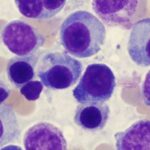Lien vers Pubmed [PMID] – 36776330
Lien DOI – 10.3389/fonc.2023.1110916
Front Oncol 2023 ; 13(): 1110916
Multiple Myeloma (MM) is an incurable neoplasm of mature B cells and the second most prevalent hematological malignancy worldwide. While combinations of proteasome inhibitors like bortezomib (Bz) and immunomodulators (IMiDs) like lenalinomide (Len) are generally effective in newly diagnosed patients, some do not respond to this first-line therapy, and all others will eventually become drug resistant. We previously reported that inhibiting the Sec61 translocon with mycolactone synergizes with Bz to induce terminal unfolded protein response in MM cells, irrespective of their resistance to proteasome inhibition. Here, we examined how Sec61 blockade interferes with IMiD action and whether it overrides resistance to Len. With this aim, we knocked out the IMiD target CRBN in the MM1S cell line and a Bz-resistant subclone to generate Len- and Len/Bz-resistant daughters, respectively. Both the Len- and Len/Bz-resistant clones were susceptible to mycolactone toxicity, especially the doubly resistant one. Notably, the synergy between mycolactone and Bz was maintained in these two clones, and mycolactone also synergized with Len in the two Len-susceptible ones. Further, mycolactone enhanced the therapeutic efficacy of the Bz/Len combination in both mice engrafted with parental or double drug resistant MM1S. Together, these data consolidate the interest of Sec61 blockers as new anti-MM agents and reveal their potential for treatment of refractory or relapsed MM.







